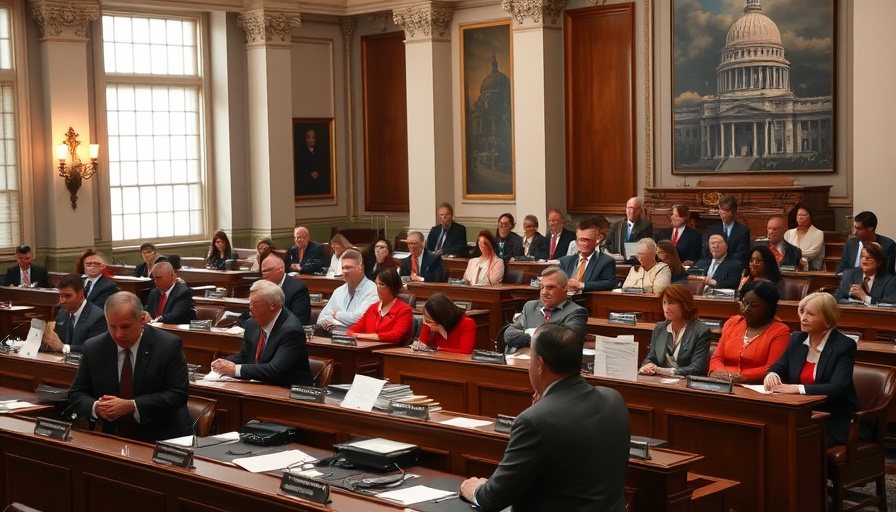
A Shifting Landscape: Iowa's New Civil Rights Law Explained
Iowa has made headlines recently for becoming the first state to eliminate gender identity protection from its civil rights code, an unprecedented shift in legal rights for transgender and nonbinary residents. This significant change means that these individuals are now left vulnerable to discrimination in various facets of life, including job opportunities and housing.
The new law, enacted by Republican Governor Kim Reynolds, emphasizes a biological definition of gender, stating that male and female are based on reproductive organs at birth. This stance reflects a growing trend seen in several Republican-led states, which promotes the idea that gender is not a spectrum but a binary classification. Governor Reynolds argued that recognizing these biological differences is essential for securing equal protection for women and girls. However, many activists argue that this view dismisses the rights and identities of transgender and nonbinary individuals.
The Background: A Quick Review of Iowa's Civil Rights Evolution
For nearly two decades, Iowa's civil rights code included protections based on gender identity, marking a progressive step forward. Yet, in just a week of debate within the Republican-controlled legislature, these protections were stripped away, raising concerns among LGBTQ+ advocates about the erosion of rights previously guaranteed.
The widespread protests at the Iowa Capitol underscored the community's strong opposition to this law. Supporters of the change argue it restores clarity by aligning state law with traditional definitions of gender, while opponents fear it undermines the existence and protections for an already marginalized population.
Broader Implications: National Trends in Transgender Rights
Iowa's recent legislation is not an isolated incident. Similar laws have emerged across the nation, reflecting a national push against transgender rights. With nearly two-thirds of U.S. adults maintaining a belief that gender is defined biologically, public support for such measures appears to be gaining traction. Yet, while polls show a majority favoring traditional definitions of gender, there is less consensus regarding discriminatory policies targeting transgender individuals.
These measures find advocates in positions of power, including former President Donald Trump, who has endorsed similar legislative efforts. Critics, however, charge that such policies only serve to amplify existing prejudices and political divides. Furthermore, the U.S. Supreme Court's recent support for Tennessee's ban on puberty blockers for minors accentuates a nationwide sentiment towards restricting transgender rights.
Impact on Lives: Real Stories from Affected Individuals
The switch in Iowa's civil rights protections poses real threats to many residents. Concerns about discrimination extend beyond broader legal battles and seep into personal lives. Interviews with residents reveal harrowing experiences of harassment and exclusion, reinforcing the notion that identity politics impacts daily living.
Activists emphasize the need for public support in the face of this evolving landscape. Many advocates are calling on allies to uplift the narratives of those affected, arguing that true equality should transcend sexual orientation and gender identity. As discrimination becomes more pervasive, maintaining visibility for these issues is crucial.
Looking Ahead: Predictions for Future Legislation
The political landscape is shifting rapidly, with Iowa at the forefront of a movement that may inspire similar actions in other states. As social attitudes towards gender identity continue to evolve, it’s essential for advocates to remain engaged in the political process. This includes resisting discriminatory measures and supporting legislation that fosters inclusivity.
Activism from organizations such as the Human Rights Campaign remains vital. Their efforts push back against regressive policies and advocate for comprehensive protections for all individuals, regardless of gender identity. Continued dialogue, education, and advocacy are necessary to safeguard the rights of vulnerable populations.
Calls to Action: Empowering the Community
As protests rise and conversations around gender identity shift nationwide, individuals within the community must stand together. Whether through participating in local advocacy programs, educating peers about transgender issues, or supporting LGBTQ+ organizations, every effort counts. The time to act is now, as communities confront challenges that could dictate the civil rights landscape for generations to come.
 Add Row
Add Row  Add
Add 




 Add Row
Add Row  Add
Add 

Write A Comment